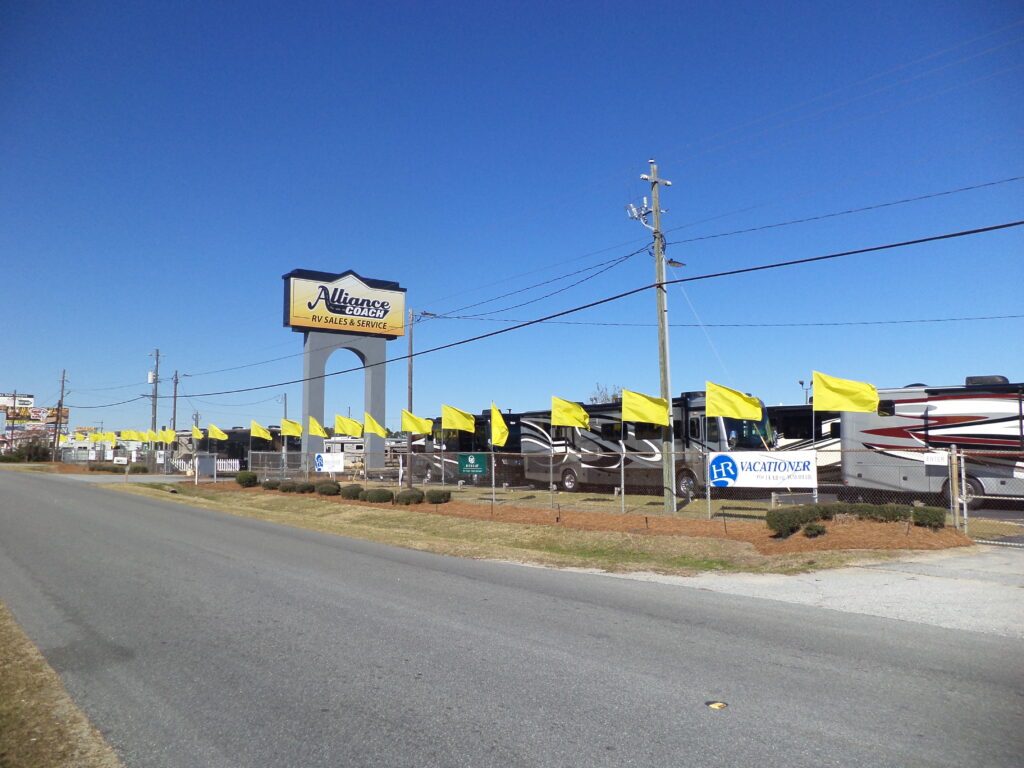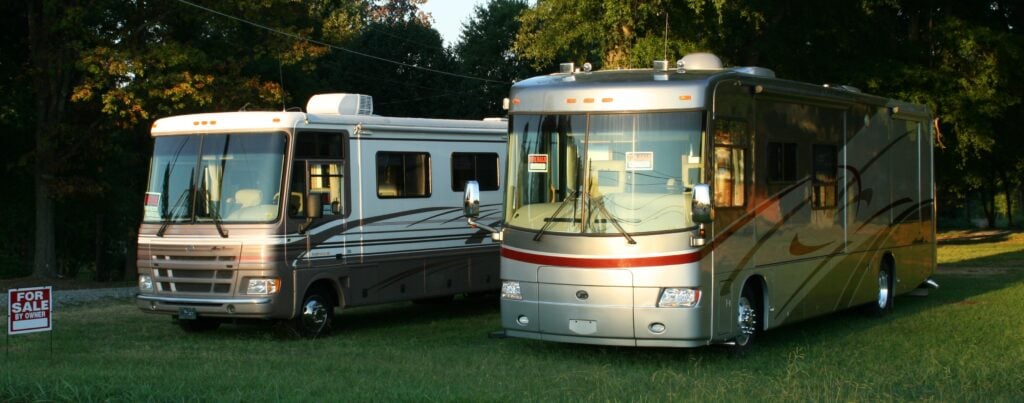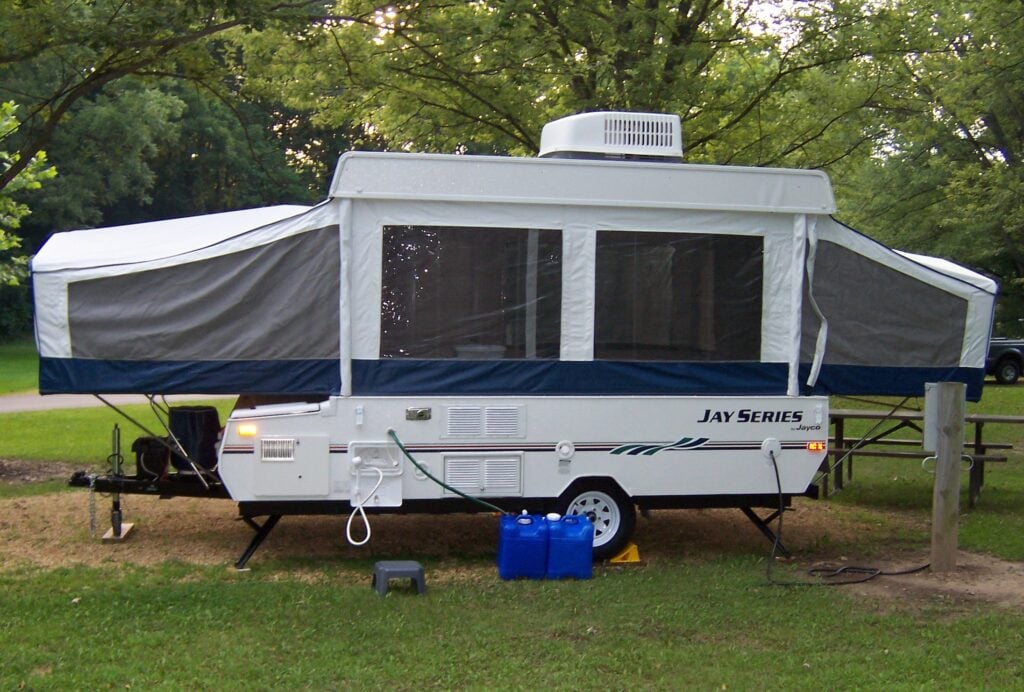
Take these RV Shopping Tips to the Dealer
There are 5 key considerations when RV shopping. All should drive your decision. You’ll be surprised to learn that price is not even on the list. Unfortunately, most RV shoppers consider the price of the RV as the very first and most important factor in their decision-making process. This clouds their judgment.
Choosing the right RV is a huge decision. If you choose wisely, you will enjoy your RV for years to come. But if your choice is based on price alone you may find that you never really feel comfortable in your RV. You may not want to even travel or camp in your new rig.
Don’t only consider the price of RVs
As a case in point, we have friends who were suffering from RV fever. This is a result of having seen the RV that we had just purchased. It was just over a year of shopping for our rig before we made the final decision.
We went to every RV show within driving distance, spent countless hours on RV lots talking to salespeople, visited campgrounds to talk with RV owners, and read anything and everything we could find on this subject. We followed the guidelines below and it worked perfectly for us.
The Class A motorhome we picked out was perfect.
We owned our RV for nearly 20 years and drove it over 120,000 miles. But our friends with RV fever rushed through the process. They ignore the guidelines below. And they focused solely on the prices of the various RVs that they were considering. They ended up buying a new Class A motorhome from a dealer and manufacturer. Neither of which would stand behind the sale.
The rig they purchased has serious design flaws. This caused endless problems with the black tank holding and discharge system. The dealer was unable and unwilling to fix it. The manufacturer was equally unconcerned.
Our friends were forced to trade in this new RV. It was less than 6 months after buying it. What had seemed like such a good deal when they bought it, cost them an additional $20,000 in lost value.
If you are considering buying an RV, consider these five key elements. Follow in the order in which they are presented before you ever start to compare prices.

Consider what size of RV best fits your needs when you’re RV shopping. Photo via Wikipedia Creative Commons
Ildar Sagdejev (Specious), CC BY-SA 4.0, via Wikimedia Commons
1. Type of RV
When buying a recreational vehicle, the first thing you’ll need to decide is what type of recreational vehicle will best fit your needs, lifestyle, and family. There are many different types of RVs from which to choose. Will a van conversion, or a large fifth wheel, travel trailer, Class C or Class A motorhome, or truck camper best fit your needs?
Perhaps a small pop-up trailer is all you’ll need for your recreational activities. But if you’re new to RVing and have never experienced any part of this adventure, you’ll need to carefully consider your personal goals and aspirations, to determine the type of RV that will best meet your needs.
Don’t get confused about type. For example, you may think of a toy hauler as a type of RV, but you can find fifth wheels and Class A motorhomes with toy hauler garage space in the back.
The main categories are Class A and Class C motorhomes, Class B, and B+ vans, travel trailers and fifth wheels, camper vans, and truck canopies. Within each of these general types, there are many variations. If you’re new to the RV genre, you may want to rent different types of RVs to see what works for your lifestyle.
2. Size
Another consideration that goes along with the type of RV is the size of the recreational vehicle that best meets your needs. Type and size often go together. If you are looking for a van conversion or truck camper you know that the rig will be smaller than most RVs. But if you are drawn to a Class A diesel pusher, the size of your rig is going to be on the larger end of the spectrum.
If you decide that a fifth wheel is the best type of RV for your needs, then the next element down the list is a consideration of the size of that fifth wheel to meet your needs. In the world of RVing size really does matter, and bigger is not always better. You need a recreational vehicle that is large enough to make you feel comfortable but small enough to be maneuverable. Where you store your RV may also be a determining factor in the size that best meets your needs.
Maybe smaller is better.
A small RV van is about the size of a standard truck or SUV and can be driven anywhere that will accommodate a car or truck. That means you can take your RV to the most remote locations and still have all your essential camping gear with you.
These vans are less costly to drive, easy to maneuver, and convenient to park, but the small size also constrained the size of its features such as the holding tanks, refrigerator, and galley. The size of an RV will define many of its features, so if you know you will need bunk beds for the kids then you’ll need a rig large enough to have space for the bunks.

A small pop-up camper like this may not provide enough room for the whole family. Photo via Wikipedia Creative Commons
Korey99, CC BY-SA 3.0, via Wikimedia Commons
3. Features
As mentioned above, there is a direct link between the size of the RV and its features and the features are a key consideration when you’re shopping for a new RV. Understanding your lifestyle and your particular needs will help you define the features that are critical for your lifestyle, which directly links back to the size and type.
I mentioned earlier that you should take this list in order, starting with the type, then the size, before considering the features, but any feature that may be a deal-breaker in your decision process needs to be considered at the same time that you’re considering the type and size of your RV.
For example, if having an on-board, fully functional bathroom is a must-have feature, then an Alpine-style travel trailer or R-Pod will not be the right type or size vehicle for your needs. If you absolutely need a toy hauler, then you know you’ll need a larger fifth wheel or Class A motorhome to incorporate this feature.
Which feature is a dealbreaker?
There are dozens and dozens of features in RVs. Some of them are essential. Some of them are just desirable luxuries. Having a refrigerator that is large enough to meet your family’s needs is a necessary feature. A washer and dryer. Recessed accent lighting. Heated floors. Solar panels. Fireplace. An outdoor entertainment center. These are all enjoyable features. But, may not be necessary for your camping enjoyment.
When shopping for an RV, consider all of the various features. Then determine which of those are absolutely essential for your personal enjoyment. You may decide that bunk beds are essential. However, a second bathroom would be a nice added feature. But is not a deal-breaker.
4. Age of the RV
Another major consideration when shopping for an RV is the age of the rig. Many people feel very strongly that it’s silly to purchase a new RV. Like cars, they depreciate immediately. There are usually many little things that need to be replaced or repaired on new RVs.
These folks think it’s better for someone else to work through all the irritants and absorb that loss in value. I, on the other hand, don’t care about the immediate loss of value. We intend to keep our RV for many years. And we want to know everything about it.

Keep in mind, some RV parks have 10-year rules. Photo via Wikipedia Creative Commons
Riley from Christchurch, New Zealand, CC BY 2.0, via Wikimedia Commons
Where it’s been, how it’s been cared for, what maintenance has been done, what systems needed attention early on, and what was done to correct the problem. So far, I’ve bought two new Class A motorhomes and I’ve been thrilled with both.
The age of your motorhome may impact the usefulness and enjoyment of your RV. There are some parks that will only accept newer than 10-year-old RVs into their parks. RVs, like cars, wear out and depreciate in value. However, there are many well-maintained older RVs with exciting luxury features available in the marketplace.
Could older be better for you?
Perhaps an older Class A diesel pusher would afford you an opportunity to own a high-end motorhome and still benefit from the hundreds of thousands of miles of functionality left in its engine. It might not be new, but it might be the right type, size, and have the best set of features for your needs.
5. Manufacturer – Will they provide support?
The fifth consideration when buying an RV is the brand and the reputation of that manufacturer. This is where talking to other RVers and RV service technicians may help you avoid a costly mistake. Do your research. Read reviews. Talk to as many RV owners as possible. Learn about the reputations of different RV manufacturers.
We met a family that bought a brand-new fifth wheel only to have it catch on fire within the first month of ownership. Fortunately, they were all safe. But in the process of having that damage repaired, they learned that other rigs by this same manufacturer had similar problems. The fire danger was known but not disclosed by the dealer.
Another couple told us the only place they were authorized to have warranty work done on their very high-end Class A diesel pusher was at the factory. Unfortunately, the factory was over 1000 miles away.
Other considerations for RV shopping
All these considerations when RV shopping may not seem to be as important as the price. But each one will significantly impact the price you pay up-front and the overall costs of owning your RV for many years.
These extended costs could be in the form of diminished enjoyment. Or, loss of functionality, and extra expenses for repairs. Of course, you’re concerned about the upfront costs. But as a long-time RV owner, I assure you that the real costs of owning an RV extends well beyond the initial purchase. Make the right decisions about the type, size, features, age, and brand of your new acquisition. I believe that you’ll see that the price will work itself out.
Some other factors you will want to consider:

This is a well-written article, but there are a few other items that MUST be added to the list:
#4a Age- Please note that many finance companies will not finance an RV older than ten years.
#6- Floorplan: Will the floorplan work with your style?
#7- Storage: When considering size, also consider where you plan to store the coach/trailer? This can add several hundred a month to your expenses.
#8- Insurance: ALWAYS compare the cost of insurance before purchasing. Even using the same insurance company with the exact same coverage, the cost between coaches could vary by hundreds to thousands of dollars per year.
Before we went to Buy our second RV Travel Trailor, my wife and I did all the above PLUS, draw the floor plan we wanted. The first dealer didn’t have any with that floor plan. The second dealer had two (different manufacturers) with the floor plan and the other 5 mentioned above. We are SOOO enjoying our 2020.
I’m surprised that you spent a year researching and then chose a motorhome.
Since that means they won’t fit in most national parks or national forest campgrounds. You have to tow a car because you can’t’ go just anywhere with a motorhome. This means maintaining two motors, two oil changes, 4 extra tires. and in some states, two-vehicle inspection stickers. On top of that, you have to unhitch the towed vehicle to back up. So having to unhitch that tow vehicle at most nature campgrounds is a pain. Not to mention that if something serious breaks, your house is in the shop, and your spending a lot on a motel room.
You make all the valid points I’d made over a year ago while I looked for a travel trailer. In lieu of a toad, an E-bike may suffice. A motorhome under 25′ (maximum 26′) will fit in most of the NPS campgrounds. A motorhome has more CCC than most trailers of the same size; is much easier to backup, or make a 3-point turn/turn around, if you can’t move forward any further. Towed many a trailer and I’ve been there where I had to unhitch the trailer to reverse my direction on a road I couldn’t pass through. If I hadn’t been with other people, I would have been screwed. I realized that as a single female who prefers boondocking, I wanted the ability to not have to leave the vehicle if I needed to “bug out” for whatever reason. I’ve been “trapped” in my house when moose have visited my Rocky Mountain property. Just my thoughts…
They do make a front end diesel toy haller!
https://www.newmarcorp.com/diesel-motor-coaches/canyon-star/floorplans/
I’ll add that size will matter in the big picture of things. Like many, with each new rv we’ve purchased they got bigger. You may save a lot of money by getting a bigger one as your first purchase…..comfort and convenience is the biggest importance factor in the rv purchasing decision.
Thank you as I plan to buy a class c rv very soon for myself aged 62,my wife age 36, and our two daughters ages 7 and 10.
Above ALL expect to fix little issues YOURSELF. Sure the warranty would cover this or that small problem but do you really want to take it to the dealer for weeks/months for that piece of trim or that screw that fell off that door?
I agree with the comments on layout and size.
Make sure you are comfortable sitting and hanging out in the RV. We went through a lot of different models and for our needs(full-time living) the living room layouts were all horrible. Some you had to turn left to look at the tv some you had to look straight up at the ceiling etc etc. Buy big the first time so you aren’t going back in a year to trade in and losing tons of $$$.
As the article said spend LOTS of time going to dealers/shows and hanging out in all types of RVs. Don’t bother going to camping world as the salesman will be breathing down your neck the entire time and you won’t be able to relax.
R pods do have fully functional bathrooms. Wet or dry. Dry has separate showers sinks medicine cabinet, very nice.
The MOST important thing to remember is, NOT to TRUST the dealer or manufacturer unless you have had experience with them.
Another thing to consider when buying Class A, air brakes! I recently purchased a Class A with air assisted hydraulic brakes. In Canada that requires an Air Brake endorsement on your driver’s license. Wasn’t an issue for me, but for some it may be.
I agree always rent a rv first to see if the size is right .buy 1 or 2 year old. You will save alot of money. Try to do all the maintenance yourself.